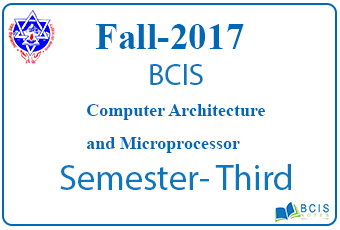
Pokhara University- Computer Architecture and Microprocessor
Level: Bachelor Semester – Fall Year: 2017
Programme: BCIS Full Marks: 100
Course: Computer Architecture and Microprocessor
Pass Marks: 45
Time: 3hrs.
Candidates are required to give their answers in their own words as far as practicable of Computer Architecture and Microprocessor. The figures in the margin indicate full marks.
Section “A”
Very Short Answer Questions
Attempt all the questions. 10×2
1. List the different non-vectored and vectored interrupt?
2. Why addressing mode is needed?
3. Which is fast- parallel or serial communication?
4. Draw the block diagram of microprocessor based system?
5. List the different timing and control signals generated by 8085 microprocessor.
6. Write major differences between address and data bus.
7. What is ‘stored program concept’?
8. What are the different modes of PPI?
9. Define RS-232.
10. What do you mean by 32 bit microprocessor?
Section “B”
Descriptive Answer Questions
Attempt any six questions 6×10
11. 20 bytes of data are stored from memory location 8000h. WAP to store all the numbers greater than 32H from memory location 9000h.
12. Describe the process how 8259A interrupt controller handles the interrupt with suitable diagram.
13. Draw the functional diagram of 8085 microprocessor and explain its blocks in detail.
14. Differentiate between parallel and serial communication? Explain about NULL MODEM configuration.
15. Define USART. With suitable diagram, explain the working mechanism of USART.
16. Draw and explain the timing diagram of MOV A, B instruction.
17.
Why DMA is needed? With suitable diagram explain about working process of 8237 DMA controller.
18. Section “C”
Case Analysis of Computer Architecture and Microprocessor
What is PPI? Why it is used? Explain about different modes of PPI? Also explain about different control words in detail.
How can you interface PPI with DIP switch (Input) an d LED (output)
in mode 0 with following configuration.
Port B as input port and port A as output port.
Port CL as input and port Cu as output.
You may also like other Question Bank

Leave a Reply